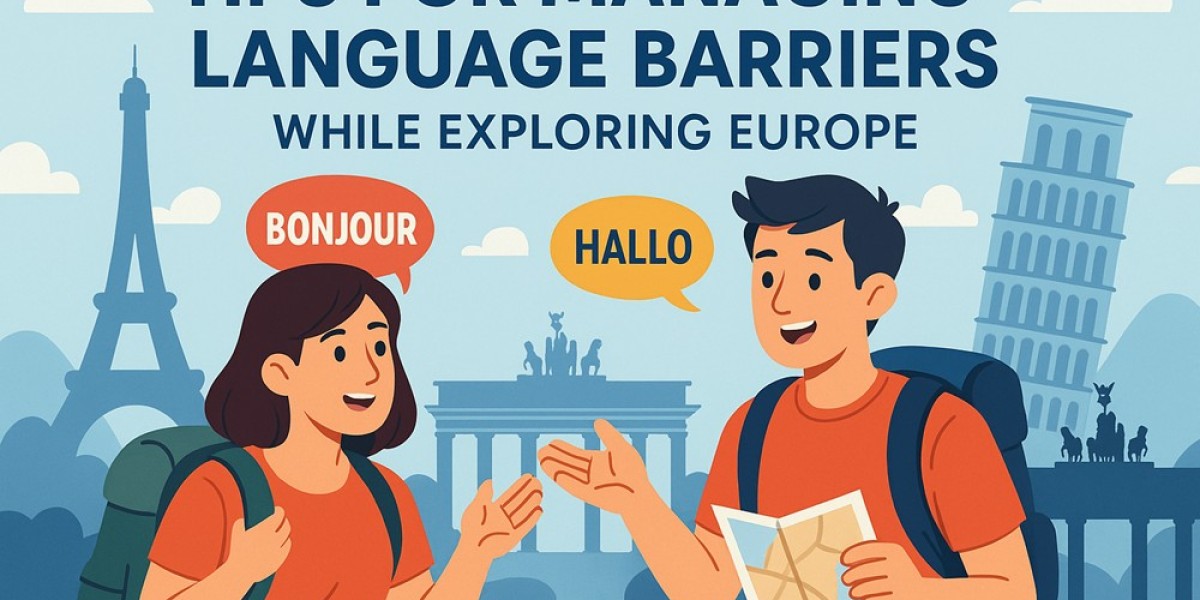Traveling across Europe is an exciting adventure. From sipping coffee in Parisian cafes to exploring the canals of Amsterdam or hiking in the Swiss Alps, Europe offers something for everyone. But one challenge many travelers face is the language barrier. Not every city or town will have English speakers, and relying solely on your native language can sometimes make communication tricky. Luckily, with a few strategies and smart planning, you can navigate Europe confidently even if you don’t speak the local language. Plus, staying connected through a reliable eSIM provider makes it easier to access translation apps, maps, and travel guides on the go.
Here are some practical tips for managing language barriers while exploring Europe.
1. Learn a Few Key Phrases
Even a small effort to speak the local language can go a long way. Learning phrases like “hello,” “thank you,” “please,” “excuse me,” and “where is…?” shows respect for the culture and often gets you more help than relying on gestures alone. Apps like Duolingo or Babbel are excellent tools to practice basic phrases before your trip.
Example phrases to learn:
French: Bonjour (Hello), Merci (Thank you), Où est…? (Where is…?)
Italian: Ciao (Hello), Grazie (Thank you), Dove si trova…? (Where is…?)
Spanish: Hola (Hello), Gracias (Thank you), ¿Dónde está…? (Where is…?)
2. Use Translation Apps
Technology makes communication easier than ever. Apps like Google Translate allow you to type, speak, or even scan text to get instant translations. Some apps even work offline, which is handy when traveling in areas with limited internet access.
Pro tip: Download offline language packs before you travel. This ensures you can still translate signs, menus, or conversations even without a Wi-Fi connection.
3. Rely on Gestures and Body Language
Non-verbal communication is universal. Pointing, nodding, using hand gestures, or miming your actions can help convey your message when words fail. A friendly smile goes a long way too. Remember, people generally appreciate the effort to communicate, even if it’s imperfect.
4. Carry a Small Phrasebook
Phrasebooks are lightweight, easy to carry, and can serve as a quick reference for essential expressions. Even if you use a translation app, having a physical backup can be useful in crowded places, noisy streets, or situations where technology fails.
5. Use Simple Language
If you’re speaking English, keep your sentences short and straightforward. Avoid slang, idioms, or regional expressions that may confuse non-native speakers. Speaking slowly and clearly increases the chances of being understood.
6. Download Offline Maps
Sometimes asking for directions is necessary, and having an offline map can solve the problem without needing much conversation. Google Maps allows you to download city maps in advance, helping you navigate easily without needing to ask locals constantly.
7. Stay in Accommodations Where Staff Speaks Your Language
Hotels, hostels, and guesthouses in Europe often have multilingual staff, especially in tourist areas. Staying in such places can help you manage bookings, ask for local recommendations, or resolve issues without worrying about language barriers.
8. Join Guided Tours or Experiences
Guided tours in English are widely available in European cities. This is especially helpful when visiting museums, historical sites, or unfamiliar neighborhoods. Tour guides not only provide information but also help you communicate with locals if needed.
9. Practice Patience and Positivity
Language barriers can sometimes lead to misunderstandings, but patience is key. Avoid frustration and maintain a positive attitude. Most locals appreciate travelers trying to communicate and will often go out of their way to help.
10. Learn Cultural Etiquette
Language isn’t just about words, it’s also about understanding cultural norms. A small gesture like greeting someone politely or using the correct handshake can make communication smoother. Research local customs and etiquette for each country you plan to visit.
11. Use Visual Aids
Carrying photos or written notes can help explain what you need. For example, if you’re looking for a specific train station, having the name written in the local language can prevent confusion.
12. Connect With Locals Through Social Media or Travel Forums
Before your trip, you can reach out to locals or expats online for tips. Apps like Meetup or Facebook groups often have communities where travelers can ask for advice or practice simple phrases with native speakers.
FAQs
Q1: Do I need to speak the local language to travel in Europe?
A: Not necessarily. Many Europeans speak English, especially in tourist areas. However, learning a few key phrases enhances your experience and shows respect for local culture.
Q2: What is the best translation app for Europe travel?
A: Google Translate is widely used, as it supports typing, voice, and image translation. It also works offline if you download language packs in advance.
Q3: Are guided tours worth it for travelers who don’t speak the local language?
A: Yes. Guided tours in English provide context, help with navigation, and reduce communication stress, making your trip more enjoyable.
Q4: How can I avoid misunderstandings when ordering food in a European country?
A: Use translation apps, point at menu items, or carry a printed list of dietary restrictions. Simple phrases like “I am vegetarian” or “No nuts” can prevent issues.
Q5: Can gestures replace language when traveling?
A: Gestures help but may not always be enough. Combining gestures with basic phrases or written notes increases effectiveness.
Conclusion
Language barriers shouldn’t stop you from exploring the beauty and culture of Europe. With preparation, technology, and a positive attitude, you can navigate foreign cities, enjoy local cuisine, and interact with residents confidently. Remember, even small efforts to communicate in the local language can make a huge difference in your travel experience.
Europe is full of unforgettable experiences, and managing language barriers is just another part of the adventure. By using these tips, you can turn potential challenges into opportunities for connection and learning.






